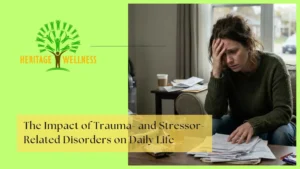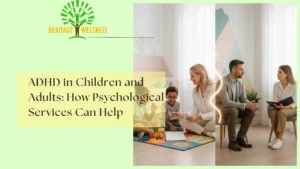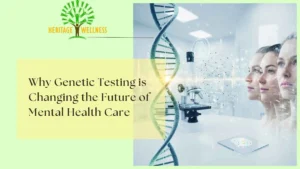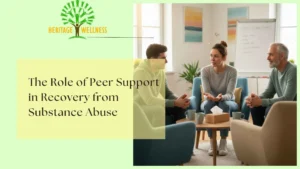
Reduced Risk of Chronic Disease: This includes chronic illnesses like Type 2 diabetes, kidney disease, hypertension, and even certain cancers. A plant-forward lifestyle is rich in fiber, antioxidants, and anti-inflammatory nutrients that support healthy blood sugar levels, improve heart function, and reduce oxidative stress, all of which are major contributors to chronic illness.
More people are adopting a vegetarian lifestyle for health, environmental, and ethical reasons. But what does the science say about its impact on longevity, disease prevention, and overall well-being? How can individuals optimize their nutrition while following a vegetarian diet? As a part of this series, we had the pleasure of interviewing Sonia Edouard.
Sonia Edouard is the Co-Founder of Heritage Wellness, a board-certified Psychiatric Mental Health Nurse Practitioner, Consultant, Speaker, and Trauma coach who brings holistic, evidence-based care to individuals navigating emotional and mental health challenges. She is affiliated with F.I.U., Walden & Chamberlain University, where she mentors and precepts future psychiatric providers. With over 12 years of experience as a healthcare provider, Sonia uses her clinical knowledge and personal journey to help others address the root causes of their struggles and reclaim their health and wellness. After surviving a hit-and-run accident in 2012, Sonia embarked on a journey to explore the mind-body connection, which she fully embraces in her practice. As a Miami native, Sonia is passionate about comprehensive health, destigmatizing mental health in underserved communities, and teaching evidence-based, faith-affirming, lifestyle-driven approaches to health and wellness.
Thank you so much for joining us in this interview series! Before we dive into the main focus of our interview, our readers would love to “get to know you” a bit better. Can you tell us a bit about your childhood backstory?
Thank you so much for having me. I was born and raised in Miami to Haitian immigrants who taught me resilience, faith, and the importance of hard work and education. My two older sisters were nurses growing up, so healthcare was always in the air in our household, but so was creativity. I enjoyed modeling in my teens, and my science classes, and I was the one always singing, journaling, dancing around the house, or finding new ways to express myself. That mix of science and soul stayed with me. It gave me a deep appreciation for both structure and intuition, which now shows up in how I approach health and healing, through evidence-based care, self-expression, and holistic wellness. My childhood laid the foundation for my work today. I love blending compassion, culture, and trauma-informed care to help people look beyond their diagnosis and move them to who they’re meant to be and thrive.
What or who inspired you to pursue your career? We’d love to hear the story.
My parents planted the seed in me early on for sure. My older sisters also inspired me as they worked in the healthcare field. So I became a nurse in 2012 and chose to pursue my master’s degree in 2016 because my brother was struggling with his mental health after playing football in college. Watching someone you love struggle mentally will wake you up for sure.
Growing up in a Haitian household, we didn’t talk about mental health. We prayed. We pushed through, but watching our brother battle what we couldn’t name at the time made me realize that strength without support breaks people. For me, it became a mission and part of why I co-founded Heritage Wellness. I knew I had to be the kind of provider who sees the person behind the pain, breaks the stigma, and helps them heal without shame. Psychiatry gave me the language. Faith gave me the heart, and my brother gave me the why. It’s been a journey, and I know I am doing what I am called to do.
It has been said that our mistakes can be our greatest teachers. Can you share a story about the funniest mistake you made when you were first starting? Can you tell us what lesson you learned from that?
So true. Well, on my first day of a nursing internship, set up by my High school professor to “test the waters” and help me figure out if I wanted to pursue a healthcare career, I had a full-blown panic attack. I mean, heart racing, and sweating, and the next thing I knew, I was out the front door, told my brother to drive me home like I’d seen a ghost. That Monday, I had to face my professor, who was furious and never spoke to me again. At the time, it felt like the end of the road, and I thought, If I can’t even get through day one, maybe healthcare just isn’t for me.
Looking back now, I laugh at how dramatic it must’ve looked. But that moment has taught me that fear doesn’t mean you’re not called, it just means you’re stretching. That experience shaped the kind of provider I am today: one who honors the vulnerability it takes to heal and who never forgets what it means to be the one running scared.
For the benefit of our readers, can you briefly let us know why you are an authority in the wellness field?
I am a board-certified Psychiatric Mental Health Nurse Practitioner, doctoral student, and consultant with over 12 years of experience in healthcare. I co-founded Heritage Wellness, a holistic mental and emotional health and wellness practice. I am also the President of VEVO Mind, a nonprofit dedicated to culturally competent, trauma-informed care, mentorship, and mental health education for underserved communities locally first, and globally. My approach is rooted in preventative medicine, holistic psychiatry, and faith, and shaped by both my clinical training and lived experience. I also believe true wellness goes beyond symptom management, is proactive, and addresses the whole person, mind, body, and spirit.
OK, thank you. Let’s now shift to the core focus of our interview about the health benefits of a vegetarian lifestyle. How would you define a scientifically-backed, healthy vegetarian lifestyle? What key principles make it nutritionally balanced and beneficial for long-term health?
According to research, a scientifically-backed, healthy vegetarian lifestyle is defined by a balanced intake of whole, minimally processed foods, but for me, it goes far beyond just removing meat; it’s about intentionally choosing nutrient-dense, whole foods that support our brain, body, and emotional well-being. Key principles include consuming a diverse array of fruits, vegetables, legumes, whole grains, nuts, and seeds to provide essential proteins, vitamins, and minerals, while minimizing processed foods, added sugars, and inflammatory oils. From a health perspective, this way of eating supports gut health, diminished inflammation, stable blood sugar, and, over time, cognitive-emotional function. When practiced with awareness and discipline, a lifestyle rich in plants can even prevent illness, improve physical health, mental alertness, improve mood and energy, and increase the ability to bounce back.
For someone looking to transition to a vegetarian lifestyle for health benefits, what is the best approach? Should they adopt it gradually or make a complete shift all at once? What does research suggest?
I think it generally varies from person to person, and this is dependent on the individual’s readiness, mindset, and relationship with food. Psychologically, it’s much easier to adjust gradually because that way you are allowed to make physical, emotional, and social adjustments. You can change your habits gradually, to avoid overwhelming yourself or running the risk of slipping back into old patterns or triggering feelings of deprivation, by, perhaps, having one plant-based meal a day or trying “meatless Mondays”. Some people can do an all-or-nothing basis, however, literally without a transition into their new lifestyles; for them, the most dramatic shifts in how they eat often come on the heels of a health scare or personal conviction. Research indicates that a gradual transition may be beneficial for many, allowing the body and mind to adapt, though some may thrive with an immediate shift. The key is self-awareness and support.
What role do added salt, oil, and sugar play in a vegetarian diet? From a health perspective, should they be minimized or avoided altogether to maximize the benefits of a plant-based lifestyle?.
I always encourage everything in moderation, and it is so vital. Salt, oil, and sugar should be used sparingly to preserve nutritional integrity and enhance long-term health. We often use these ingredients to enhance flavor or texture in processed plant-based foods, but in excess, they contribute to inflammation, insulin resistance, and mood instability, especially in individuals with underlying anxiety, depression, or metabolic imbalances. To everybody who reads this, “Put off” all the additives, and you will have clearer thoughts, stable energy levels, and better emotional regulation. It doesn’t mean you can’t use them; it just has to do with awareness and balance. Trust me, these little intentions make a well and proper difference while lifting the mental and physical health advantages of plant-forward lifestyles.
Is adopting a well-balanced vegetarian diet an effective and sustainable way to permanently lose 20 or more pounds? If so, what scientific evidence supports this approach?
Absolutely. I recommend starting with small, achievable goals because when done with intention, a well-balanced vegetarian diet can be an effective and sustainable approach to losing weight, especially when you prioritize whole foods over processed foods. I am talking about real high-fiber, protein foods that will keep you filled, support your gut, and not leave you with late-night fridge raids at midnight. According to research, a calorie deficit is key for weight loss. Plant-forward diets naturally support this process by increasing fiber and fullness while lowering overall calorie intake. Studies show that plant-based eaters tend to have lower BMIs, better blood sugar control, and reduced risk of obesity-related diseases. Here’s the part I love as a psychiatric provider: the same foods that help us shed weight are also helping regulate our mood, focus, and cravings. That’s not just weight loss, that’s whole-person healing. Therefore, yes, if you are trying to lose 20 pounds without punishing yourself, and know that plant-forward living is a go.

Here is our main question. What Are “5 Science-Backed Benefits of a Vegetarian Lifestyle”? (If possible, please share a story or example for each one)
- Improved cardiovascular health: A vegetarian diet has been shown to lower blood pressure and cholesterol, reducing the risk of heart disease. I have watched several patients walk into the clinic nearly and are hypertensive, and then walk out with normal readings between 3 to 6 months after making the switch to a plant-based lifestyle.
- Improved mental clarity and mood: The Truth is that a healthy gut means a happier brain. For instance, many of my clients have reported increased vitality and sharper focus after embracing this lifestyle, I believe due to improved gut health and lower inflammation.
- Better glycemic control: This includes chronic illnesses like Type 2 diabetes, kidney disease, hypertension, and even certain cancers. I had a case with a woman in her early 40s, recently diagnosed with prediabetes, who was suffering from ongoing anxiety. I believe in holistic medicine, and am big on diet and exercise, especially the nutrition aspect since it has a huge impact on metabolic as well as mental health. She was willing to take on some lifestyle changes and turned down medication, and we created a plant-forward nutrition plan that honored her culture and included food supporting both her brain and body health. Her A1C dropped back into the normal range within four months, her anxiety symptoms became more manageable, and her energy and mood improved significantly. Moments like that help me remember the power of food as medicine!
- Sustainable weight management: With more fiber and fewer empty calories, plant-based diets support natural weight loss. One of my clients lost over 25 pounds in 6 months without counting calories, just by switching to whole, plant-based meals.
- Reduced Risk of Chronic Disease: This includes chronic illnesses like Type 2 diabetes, kidney disease, hypertension, and even certain cancers. A plant-forward lifestyle is rich in fiber, antioxidants, and anti-inflammatory nutrients that support healthy blood sugar levels, improve heart function, and reduce oxidative stress, all of which are major contributors to chronic illness.
Many people worry that a vegetarian diet might be too restrictive or difficult to sustain long-term. What are some practical tips for making this lifestyle both enjoyable and sustainable?
First of all, rejecting the word “diet” and treating it like a genuine shift in lifestyle through self-care instead of deprivation would be my first advice. I tell people all the time to make it a lifestyle. Also, don’t overwhelm yourself. Start small and build from there. Another practical tip would be to surround yourself with people who support your journey, begin meal planning, be creative, and be willing to try out new spices, cuisines, and vegetables you may not have eaten growing up.
There’s a lot of conflicting information about nutrition in the media. What are some of the biggest myths about plant-based eating that you’d like to debunk?
Wow, where do I start? One of the biggest myths is that plant-based eaters have inadequate protein intake. That’s just not true. You can get plenty of high-quality protein from beans, lentils, quinoa, nuts, tofu, and even leafy greens. Another myth is that eating plant-based food is expensive. Yes, some trendy products can run your pockets, but the basics like rice, beans, veggies, oats, and herbs are affordable, especially when you meal prep and buy in bulk. I always tell my clients that their budget might need adjusting, not expanding. Lastly, there’s the myth that plant-based eating is joyless. The truth is, if your food is seasoned, satisfying, and rooted in your culture, it can be just as comforting and flavorful if not more. Remember, get creative.
Ok, we are nearly done. You are a person of great influence. If you could inspire a movement that would bring the most amount of good for the greatest number of people, what would that be? You never know what your idea can trigger.
If I could inspire a movement, it would be called “Heal Your Roots,” a program that empowers people to heal their emotional, nutritional, and spiritual roots through culturally competent and holistic care. It would also be centered on compassion, scientific understanding, and accessible healthy living for the greatest number of people, especially those in underserved communities and beyond.
We are very blessed that some of the biggest names in Business, VC funding, Sports, and Entertainment read this column. Is there a person in the world, or in the US, whom you would love to have a private breakfast or lunch with, and why? He or she might just see this, especially if we both tag them 🙂
Oh my, hands down, I would say Michelle Obama. I would love to have a private breakfast or lunch with her and literally just listen and soak up her wisdom. She is a woman who symbolizes hope, grace, perseverance, beauty, and brains for sure. I admire her for how she used her platform to help so many children, veterans, families, and underserved communities. I appreciate her efforts, and personally, as an individual who also believes in healing from the ground up, healthy eating, physical activity, emotional wellness, and education it would be an honor to speak with her about ideas and perhaps how we could work together to continue to build systems that serve those who require it the most. I think she’s amazing!
How can our readers further follow your work online?
You can follow Heritage Wellness on social media or visit our website at heritagewellnessus.com. For my nonprofit work, visit vevomind.com. Thank you so much.
Thank you for these really excellent insights, and we greatly appreciate the time you spent on this. We wish you continued success.
About the Interviewer: Stanley Bronstein is an attorney, CPA, and author of more than 20 books. However, he doesn’t consider any of those his greatest achievements. His most significant accomplishment was permanently losing 225 pounds and developing the personal growth system that made it possible — The Way of Excellence. As a catalyst for change, he has dedicated his life to helping others maximize their potential, transform their lives, and achieve optimal health. To learn more, you can download a free PDF copy of his latest book, The Way of Excellence Journal, at https://TheWayOfExcellence.com.







2 Responses